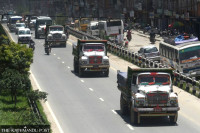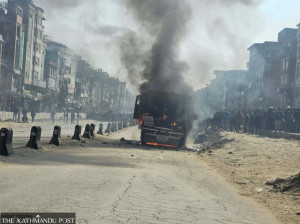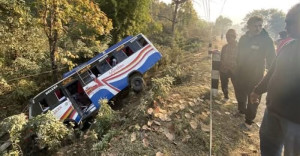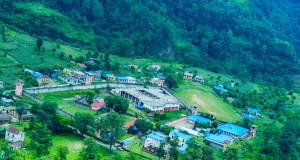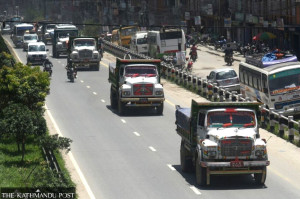Bagmati Province
Sauraha elephant owners say Chitwan park authority has barred them from grazing their animals
The park’s decision has troubled the elephant owners who were already burdened by the cost of their animals’ upkeep during the pandemic slump.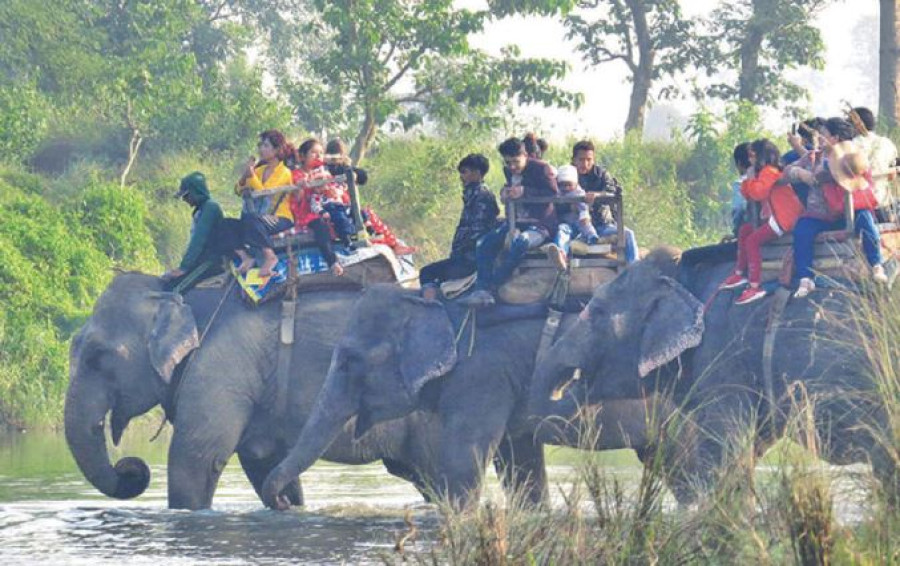
Chandan Kumar Mandal
Local elephant owners in Chitwan have been struggling to feed their animals for months now, as the Chitwan National Park authority has barred privately-owned elephants from entering the park to graze.
There are as many as 70 privately-owned elephants in Sauraha, one of the major hubs for wildlife tourism in the country. Their owners say they have had tough times feeding these animals after the tourist arrival in the area slumped to zero in the wake of the Covid-19 pandemic and the nationwide lockdown.
After growing concerns about the health and wellbeing of these captive elephants from the animal rights activists, local tourism entrepreneurs and elephant owners, the local authorities and park had allowed the elephants to graze on grassland areas near the banks of the Rapti river.
However, according to Narayan Rupakheti, chief conservation officer of the park, said no such permission was ever given by the park authority to allow privately-owned elephants inside the protected area.
Besides, he said the problem of feeding the elephants had come up during the dry season.
“Now, there is enough greenery everywhere for the elephants to graze on,” Rupakheti said.
He reiterated that the park authority simply cannot allow privately-owned elephants or cattle inside the park’s core area. “Our park’s laws do not allow that,” he said.
Local elephant owners, however, say that they had secured permission to take out their elephants to graze on the grasslands along the Rapti river banks, which separates the resort town of Sauraha and the core area of the park.
Even the US-based animal rights organisation, Elephant Aid International, in early April had said that the park authority had agreed to allow privately-owned elephants to graze on the grasslands adjacent to the Rapti river.
Rishi Tiwari, the president of United Elephant Cooperative Limited, a group of elephant owners providing elephant safari to visitors in Sauraha, the elephants were allowed to graze on the grasslands along the Rapti river for two months before the park authority announced the proscription.
All of sudden the park barred us from taking our elephants to graze on the grasslands, which do not fall in the park’s core area,” Tiwari, who himself owns two elephants, told the Post.
The local elephant owners have been helping out with various park-related works, the park authority could at least allow them to graze their animals, Tiwari said.
“We had also supported the park by giving them our elephants for three days for grassland management at old Padampur area. Rather than returning the favour, the park officials have stopped us from taking our elephants to graze along the river banks, which is far from the dense forest.”
Appalled by the park’s decision, the elephant owners on Thursday organised a press meet to draw the attention of the local authorities to their concerns.
“Even if our elephants are not allowed to graze inside the park, the park authority could at least support us by giving us grass or by allocating a grazing area in the buffer zone, along the river bank or other locations,” said Tiwari.
Elephant safari is one of the main attractions of Sauraha tourism. However, the Covid-19 pandemic has left the local elephant owners in a terrible financial situation. The cost of feeding and upkeep of a single elephant could run up to somewhere between Rs 80,000 to Rs 100,000 per month. With the tourism industry at a complete shutdown, the elephant owners in Sauraha have been running up the cost of keeping their animals fit and healthy without making any income for months now.
“A certain amount of the money we earn from elephant safaris also goes to the state coffers. The government should acknowledge our elephants’ contribution and do something to save them during these difficult times, as well as help sustain elephant safari, which is integral to Sauraha’s tourism,” Tiwari said. “If the government cannot do so, then it should buy all these elephants from us and try to run the business that we have been running all these years.”




 22.3°C Kathmandu
22.3°C Kathmandu
